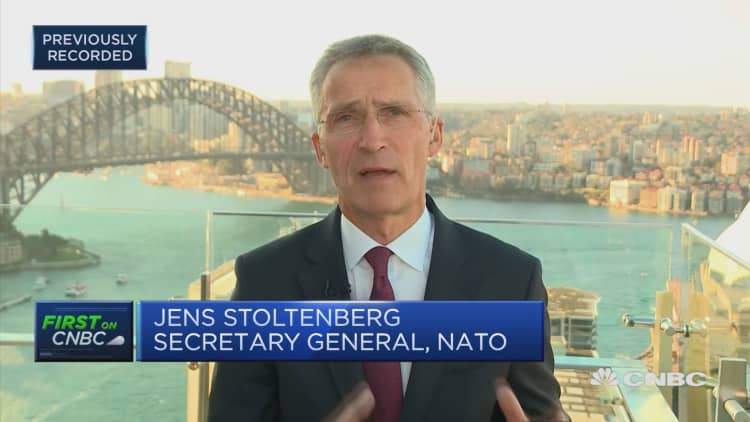
NATO Secretary General Jens Stoltenberg told CNBC Wednesday that the defense alliance is carefully monitoring China's increased presence in the Arctic, amid growing divisions in the polar region.
His comments come at a time when countries are scrambling to claim territory or boost their presence in the high north, as thawing ice raises the possibility of exploiting much of the world's remaining undiscovered reserves of oil and gas and mineral deposits.
"We need to assess the security consequences, for all of us, of the rising military power of China," Stoltenberg told CNBC's "Squawk Box Europe."
NATO's secretary general said it appeared China was "coming closer" to Europe, citing the Asian giant's increased physical presence in the Arctic as well as Africa.
"And, of course, we need to carefully analyze and understand the security implications of that."
China claims to be a 'near-Arctic state'
Earlier this year, U.S. Secretary of State Mike Pompeo urged the international community to track China's movements in the Arctic, warning the country appeared to have national security aims there.
China disputed Pompeo's criticisms, calling them "totally out of sync with the facts." Beijing added it is prepared to work with relevant parties to jointly understand and protect the Arctic, while making its own contribution to the region's peace.
The shortest distance between China and the Arctic Circle is roughly 900 miles, but the country has previously described itself as a "near-Arctic state."
The world's second-largest economy has been increasingly active in the polar region in recent years, becoming an observer member of the Arctic Council in 2013.
The Arctic Council refers to an intergovernmental forum which aims to promote co-operation, co-ordination and interaction among Arctic states.
The group consists of five NATO allies: Canada, Denmark — including Greenland — Iceland, Norway and the U.S. It also has three non-NATO members: Finland, Russia and Sweden.
Given that most Arctic Council members are also NATO allies, the defense alliance has a vested interest in keeping tensions low in the high north.
Climate change
The U.S. National Snow and Ice Data Center said in a report published Tuesday that after Europe experienced another climate-change driven heatwave last month, sea ice concentrations in the Arctic were now low — "with many open water areas between ice floes."
By the end of the month, the Northern Sea Route that links Europe and Asia through the East Siberian and Laptev Seas appeared to be "essentially open," the data center said, whereas the Northwest Passage (both the southern and northern routes) remained blocked by ice.
The Northern Sea Route is a shipping route running along the Russian Arctic coast, while the Northwest Passage refers to a sea route that connects the Atlantic and Pacific Oceans via the Canadian Arctic Archipelago.
China is thought to be seeking to take advantage of the melting ice caps, as areas of the Arctic that were once impassable now constitute a gateway to greater trade.
The rising prominence of China in the polar region has sparked concern from Arctic states over its long-term strategic objectives, including possible military deployment.
In May, the Pentagon released a report saying deepening Chinese activities in the Arctic region could pave the way for a strengthened military presence — including the deployment of submarines to act as deterrents against nuclear attack.
— Reuters contributed to this report.


